The conviction of Adam Smith-Connor for silent prayer inside an abortion clinic “buffer zone” marks an era-defining moment. The law needs clarifying urgently, says Lois McLatchie-Millar, before the UK’s human right’s record becomes an international laughing stock

British courts have convicted a military veteran and father of two for praying silently about abortion, in his mind, for three minutes, on a public green near an abortion facility in Bournemouth.
This might have been the most expensive silent prayer in history. Adam Smith-Connor, who served in Afghanistan, was given a criminal record and ordered to pay £9,000 in adverse costs for breaking the rules of a local “buffer zone” ordinance banning “expressions of approval or disapproval” of abortion on several streets in the area.
Judge Orla Austin ruled that even though he was only engaged in silent, prayerful thought, his presence within the buffer zone could still have a “detrimental effect” on people attending or working at the clinic. Leaning on the fact that Adam’s hands were clasped, and that he may have had his head “slightly bowed”, she concluded that members of the public might have been able to perceive that he was praying.
A confusing message
The case marks the first known conviction based on silent thought in modern British history. But elsewhere in the country, we have seen differing outcomes for those “caught” with prayers in their head on the wrong street. This summer, Isabel Vaughan-Spruce received a payout of £13,000 from West Midlands Police for being unlawfully arrested for the very same thoughts.
The difference between the two outcomes perfectly demonstrates the lack of clarity in the law - and the near absolute discretion given to law enforcers on any given day.
Power should never be ceded to the state to make up the rules as they go along
In Birmingham, they rightly recognised - in accordance with domestic and international law - that state interference with thought is unlawful, leading to “not guilty” verdicts and a compensation payout.
In Bournemouth, an ideological council rather than an independent state prosecutor prosecuted the case and persuaded the judge. Unclear laws and subjective interpretations led, ultimately, to a different verdict.
Criminal law should be clear, predictable and consistent. Citizens should know when their actions incur criminal liability. Power should never be ceded to the state to make up the rules as they go along, particularly when those rules relate to the thoughts raised to God in the privacy of an individual’s mind.
An era-defining case
Several further questions were raised by Adam’s defence about the credibility of placing thought on trial. If a person prays about their ill family member, for world peace or for food provisions while walking through a buffer zone – but their mind turns momentarily to abortion and to praying for the women making difficult choices about this issue that day – did they become a criminal only for those few seconds of prayer?
And how can it be right that, under current law, Adam could have spoken angrily for hours about climate change or Middle Eastern wars, protected by his free speech rights – but couldn’t pray for a few minutes about this issue?
The case marks the first known conviction based on silent thought in modern British history
The conviction on the basis of a silent prayer is era-defining. For generations, the West has been seen as a stalwart of human rights on the international stage – a home for freedom of speech and other civil liberties. Few could have imagined, even a decade ago, that Britain would have come so far in censoring peaceful speech, let alone thought.
Christians could be in for a lot more of this. On 31 October, the government will roll out “buffer zones” around every abortion facility nationwide. The vague and far-reaching wording of the law could find people in trouble for merely engaging in consensual conversation with a friend of family member about abortion, or simply praying silently in their minds.
It is incumbent on the government to clarify that their law does not interfere with mere silent thought, before the country loses all credibility on their ability to preserve basic human rights.





































8 Readers' comments